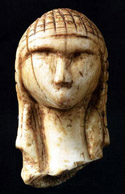Anthropology, Department of

Department of Anthropology: Faculty Publications
Document Type
Article
Date of this Version
1985
Citation
Ethology and Sociobiology
Abstract
Although much research has been devoted to studying sex differences In functioning (e.g., Maccoby and Jacklin 1974), most efforts have been directed toward documenting or elucidating the proximate causes of sex differences. Few attempts have been made, however, to explain the ultimate causes of these differences or the selective pressures that have led to the development or psychological differences between males and females [for exception see Symons (1979) and Daly and Wilson (1983)]. Toward this end of blending psychology with evolutionary theory we develop what we call the " primary caretaker hypothesis," which predicts that the sex that through evolutionary time has dominated infant caretaking will differentiated exhibit skills that are important In caretaking (e.g., the ability to rapidly recognize Infant emotional expressions). Evidence is advanced to show that females dominate childcare in nonhuman primates and humans and that a high level of care or infants Is crucial, given universally high infant mortality rates throughout our evolutionary history and the number ol potential hazards impairing infant development. The prompt and accurate recognition of infant emotional cues-especially in the face-is an important component caretaking practices, and thus selective pressures should result in greater proficiency in this ability in the sex that caretakes most. An experimental procedure is described where informants were tested in their speed and accuracy of identifying infant facial expressions or emotion. A statistical analysis of the results revealed that females were significantly more accurate and rapid than males In their discrimination of facial expressions and that previous experience in childcare had no effect on sex differences. Follow up research on the "primary caretaker hypothesis" is proposed.
Included in
Behavior and Ethology Commons, Biological and Physical Anthropology Commons, Child Psychology Commons, Social and Cultural Anthropology Commons

